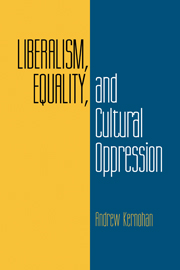5 - Liberalism and the Reform of Culture
Published online by Cambridge University Press: 11 January 2010
Summary
A person's ultimate interest is in living as meaningful, worthwhile, and valuable a life as possible. Consequently, people have a highest interest in coming to know the good and a highest-order interest in implementing that knowledge. To implement their conceptions of the good, people require a fair share of the world's resources. What constitutes a person's fair share of the world's resources is the problem of distributive justice. To come to know the good, people require a cultural environment free of practices that would enculturate false and undermining beliefs about value. How to reform the cultural environment is the problem of liberation. Egalitarian liberal thought has neglected this second problem.
Human beings are essentially social. They are born, socialized, and enculturated into the inherited beliefs and ideas that make up a culture. Human beings are inescapably members of one culture or another. The value of people's cultural membership is ambiguous; its effects can be both beneficial and harmful. Liberals have recently, and quite rightly, emphasized the benefits of cultural membership. Nevertheless, forgetting that culture also has an oppressive side is wrong. We do not choose all the beliefs about value that make up our more significant ends. Either we take them up directly from what our culture presents or we arrive at them by deliberation on normative and factual background beliefs taken up unreflectively from our culture. The human capacity for critical reflection is finite, both for the philosopher in her study and for people leading busy and sometimes desperate lives outside academia. In an inegalitarian culture, many of the beliefs that people take up from their cultural environment are based on beliefs about the moral inequality of persons.
- Type
- Chapter
- Information
- Liberalism, Equality, and Cultural Oppression , pp. 88 - 109Publisher: Cambridge University PressPrint publication year: 1998



